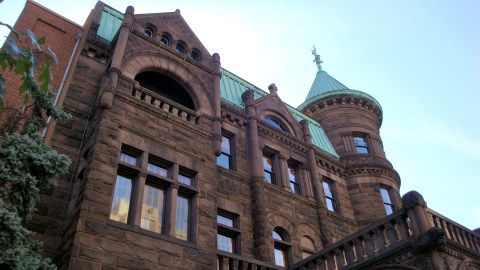This article originally appeared in the July/August 2009 issue of Museum magazine, a benefit of AAM membership.
Q:
I am the director of an art museum in a small liberal arts college. The college is having financial problems and the new president has decided to close the museum and sell the collections. Is this ethical? Do we have legal recourse?
A:
This is an extreme example of a problem that has become all too common lately. Doubtless you have read articles (like the one on page 54) about college museum directors contending with administrators or boards of governors who want to sell collections to fund operations or rebuild the college endowment. And if you are a college or university museum director reading this article, you might want to start thinking about this now, rather than waiting until the provost calls you in for a chat.
We would love to be able to tell you it is unethical for the college to close the museum, but we can’t. There are very clear museum guidelines establishing that it is unethical to sell the collections to pay operating expenses, but museum ethics are developed by and are binding for museums, not their parent organizations. There is unfortunately no code of ethics for colleges and universities that compels them to treat collections—or museums—in this way.
A college’s obligation is to its mission, which is to educate. One can certainly make a case that an art museum contributes to this work, but the college is nevertheless free to choose what programs best enable it to fulfill its mission in the most effective and efficient manner. It is also free to change its mind and end programs—even venerable and distinguished ones—that it sees as no longer contributing. Unless maintaining a museum is written into the college’s charter or bylaws, a financial crunch or a change in board priorities can lead to a swift and ruthless end for the museum operation.
So much for academic ethics, but there is also the law to consider. There may or may not be legal impediments to a college closing a subsidiary museum. Did the college accept gifts of money or collections with written restrictions imposed by the donor that obligate the college to operate the museum or maintain the collections? Such restrictions may buy you a reprieve, but even they can’t guarantee a pardon. The college can go to court and ask for a cy près ruling, arguing in effect that what they intend is “close enough” to the donor’s original intent. If the judge is persuaded, the courts can set aside or modify donor restrictions accordingly. If the college’s calculations show that running the museum is an ongoing financial burden, they could even offer to return gifts to donors in return for being let off the hook.
In our experience, the best buffer against the vagaries of academic economics and changing college administration priorities is an independent champion with shared legal responsibility for the museum. A separately incorporated, private nonprofit “friends of the museum” organization can play the role of staunch defender. If the friends group brings enough to the table, they can even negotiate a written operating agreement or memorandum of understanding (MOU) with the college.
A truly wise operating agreement foresees the potential for conflict of interest arising from the divergent missions of the parent college and the museum and establishes a process for negotiating outcomes. It may offer the friends organization joint authority for major decisions in return for ongoing financial support of the museum. At the very least, this provides a formal role for stakeholders who put the museum’s interests first.
On a more ambitious scale, the friends may offer to take over operation of the museum as an independent nonprofit entity, allowing the parent institution to withdraw support after a negotiated transition period. However, working out titles to collections can be a sticky point if the goal is complete independence. It is one thing for a college to let a friends group take on the bother and expense of operating the museum but quite another to transfer title to a bazillion dollars worth of art as part of the bargain. It follows that the time to make such an argument is during a period of relative prosperity, not when the bill collectors are at the provost’s door.
If your college’s financial situation has already reached a crisis point, your options are limited. Your best recourse is probably an appeal to the power of public opinion. Whose good opinion does the administration and the board of governors care about (read: alumni, major donors)? How many of them would be upset if the college closes the museum or sells the collections? The powers that be may reconsider if they see closing the museum as an action that costs more in lost giving than it gains in the short term. And don’t underestimate the power of the press. No college board likes to see its institution beat up in the news.
The bottom line is that museums run by nonmuseum parent organizations are inherently vulnerable. The parent organization will, quite properly, act in the best interests of its own mission, and this may be at the expense of the museum. This risk is the tradeoff for the resources and financial security provided by such a parent when times are good.
We wish you the best of luck. And if you manage to avert the crisis this time, we urge you to start working right away on a longer-term solution. Can we provide some information on how to incorporate your donors and docents as a separate 501(c)3 friends group?
Elizabeth E. Merritt is founding director of AAM’s Center for the Future of Museums, and Erik Ledbetter is director of AAM’s international programs.








